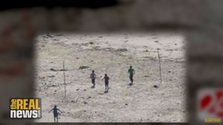10 sept 2018
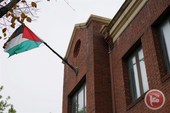
Members of the Executive Committee of the Palestine Liberation Organization (PLO), responded on Monday to the expected announcement that the United States administration will close the PLO’s office in Washington as part of a widening US pressure campaign on Palestinian officials amid stalled Middle East peace prospects.
Dr. Hanan Ashrawi, said in a statement "It is ironic that the US is punishing the PLO, the national representative of the Palestinian people and the highest political body that made the commitment to reaching a political and legal settlement of the Palestinian question and that has engaged in negotiations with successive US administrations for decades."
"It is also extremely cruel and spiteful to persist in deliberately bashing the Palestinian people by denying them of their rights, giving away their lands and rightful capital of Jerusalem, and defunding UNRWA (the United Nations Relief and Works Agency for Palestine Refugees) and Palestinian institutions, including East Jerusalem hospitals.:
She stressed "Such irresponsible moves are clear proof of American collusion with Israel's occupation and the rewards, inducements and incentives it provides Israel, as well as a total ignorance of the requirements of a just peace based on international law and respect for human rights."
Ashrawi concluded "Palestinians will not surrender and that no amount of coercion or unwarranted collective punitive measures will bring the Palestinian leadership or people to their knees."
Saeb Erekat also responded to the closure in a press release "This is yet another affirmation of the Trump Administration’s policy to collectively punish the Palestinian people, including by cutting financial support for humanitarian services including health and education."
Erekat warned that "this dangerous escalation shows that the US is willing to disband the international system in order to protect Israeli crimes and attacks against the land and people of Palestine as well as against peace and security in the rest of our region."
Erekat was referring to the US threatening the International Criminal Court (ICC), based in The Hague, of not prosecuting any Israeli officials as demanded by the Palestinians otherwise it will be subjected to severe sanctions.
"The rights of the Palestinian people are not for sale, that we will not succumb to US threats and bullying and that we will continue our legitimate struggle for freedom, justice, and independence, including by all political and legal means possible."
He added "Accordingly, we continue to call upon the International Criminal Court to open its immediate investigation into Israeli crimes."
Erekat called on the international community to respond to the awaited US administration’s decision, emphasizing "Lowering the flag of Palestine in Washington DC means much more than a new slap by the Trump administration against peace and justice; it symbolizes the US attacks against the international system as a whole, including the Paris Convention, UNESCO and the Human Rights Council among others."
Additionally, Erekat said that the PLO will take necessary measures to protect the rights of Palestinians living in the US to be able to access their consular services.
Dr. Hanan Ashrawi, said in a statement "It is ironic that the US is punishing the PLO, the national representative of the Palestinian people and the highest political body that made the commitment to reaching a political and legal settlement of the Palestinian question and that has engaged in negotiations with successive US administrations for decades."
"It is also extremely cruel and spiteful to persist in deliberately bashing the Palestinian people by denying them of their rights, giving away their lands and rightful capital of Jerusalem, and defunding UNRWA (the United Nations Relief and Works Agency for Palestine Refugees) and Palestinian institutions, including East Jerusalem hospitals.:
She stressed "Such irresponsible moves are clear proof of American collusion with Israel's occupation and the rewards, inducements and incentives it provides Israel, as well as a total ignorance of the requirements of a just peace based on international law and respect for human rights."
Ashrawi concluded "Palestinians will not surrender and that no amount of coercion or unwarranted collective punitive measures will bring the Palestinian leadership or people to their knees."
Saeb Erekat also responded to the closure in a press release "This is yet another affirmation of the Trump Administration’s policy to collectively punish the Palestinian people, including by cutting financial support for humanitarian services including health and education."
Erekat warned that "this dangerous escalation shows that the US is willing to disband the international system in order to protect Israeli crimes and attacks against the land and people of Palestine as well as against peace and security in the rest of our region."
Erekat was referring to the US threatening the International Criminal Court (ICC), based in The Hague, of not prosecuting any Israeli officials as demanded by the Palestinians otherwise it will be subjected to severe sanctions.
"The rights of the Palestinian people are not for sale, that we will not succumb to US threats and bullying and that we will continue our legitimate struggle for freedom, justice, and independence, including by all political and legal means possible."
He added "Accordingly, we continue to call upon the International Criminal Court to open its immediate investigation into Israeli crimes."
Erekat called on the international community to respond to the awaited US administration’s decision, emphasizing "Lowering the flag of Palestine in Washington DC means much more than a new slap by the Trump administration against peace and justice; it symbolizes the US attacks against the international system as a whole, including the Paris Convention, UNESCO and the Human Rights Council among others."
Additionally, Erekat said that the PLO will take necessary measures to protect the rights of Palestinians living in the US to be able to access their consular services.
|
|
The Trump administration is expected to announce Monday that it will close the Palestine Liberation Organization’s (PLO) office in Washington, administration officials said Sunday night, widening a U.S. campaign of pressure amid stalled Middle East peace efforts.
“The United States will always stand with our friend and ally, Israel,” national security adviser John Bolton planned to say in prepared remarks he is scheduled to deliver Monday, according a draft reviewed by The Wall Street Journal. “The Trump administration will not keep the office open when the Palestinians refuse to take steps to start direct and meaningful negotiations with Israel,” he planned to add. According to The Wall Street Journal, Bolton also planned to threaten to impose sanctions against the International Criminal Court if it moves ahead with investigations of the U.S. and Israel. Among the responses, Bolton says, the U.S. would ban ICC judges and prosecutors from entering the country. The PLO office in Washington has long been the focus of controversy. The Trump administration warned last year that it might close the office after Palestinian Authority President Mahmoud Abbas called for the investigation and prosecution of Israeli officials by the ICC and other bodies. Saeb Erekat, a senior Palestinian Authority negotiator responded at the time that such a move would undermine prospects for peace. |
The PLO opened its mission in Washington in 1994 and joined the ICC after receiving observer state status at the U.N. in 2012.
The closure, which Bolton says would be formally announced by the State Department on Monday, follows other steps by the Trump administration that have angered Palestinians, including moving the U.S. embassy to Jerusalem from Tel Aviv and ending funding for the U.N. agency that helps Palestinian refugees.
“The United States supports a direct and robust peace process, and we will not allow the ICC, or any other organization, to constrain Israel’s right to self-defense,” Bolton also planned to say, according to the prepared remarks.
A particular concern has been a request last year by the ICC prosecutor to investigate U.S. military and Central Intelligence Agency personnel who served in Afghanistan for detainee abuse and possibly other war crimes.
In the prepared remarks planned for Monday, Bolton offers an extended critique of the court, which he asserts is rife with abuses, and vows that the U.S. will use “any means necessary” to protect American citizens and those of friendly allies from prosecution by the court.
According to the same source, nations that cooperate with ICC investigations of the U.S. and its allies will also risk losing foreign aid. Other responses include economic sanctions against the court itself. The U.S. also will consider asking the U.N. Security Council to constrain the court’s authority.
The closure, which Bolton says would be formally announced by the State Department on Monday, follows other steps by the Trump administration that have angered Palestinians, including moving the U.S. embassy to Jerusalem from Tel Aviv and ending funding for the U.N. agency that helps Palestinian refugees.
“The United States supports a direct and robust peace process, and we will not allow the ICC, or any other organization, to constrain Israel’s right to self-defense,” Bolton also planned to say, according to the prepared remarks.
A particular concern has been a request last year by the ICC prosecutor to investigate U.S. military and Central Intelligence Agency personnel who served in Afghanistan for detainee abuse and possibly other war crimes.
In the prepared remarks planned for Monday, Bolton offers an extended critique of the court, which he asserts is rife with abuses, and vows that the U.S. will use “any means necessary” to protect American citizens and those of friendly allies from prosecution by the court.
According to the same source, nations that cooperate with ICC investigations of the U.S. and its allies will also risk losing foreign aid. Other responses include economic sanctions against the court itself. The U.S. also will consider asking the U.N. Security Council to constrain the court’s authority.
24 aug 2018
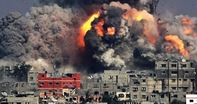
On 15 August 2018, the Israeli Military Prosecution decided to close the file investigation related to the killing of dozens of Palestinian civilians by Israeli forces in an intensive bombardment, which indiscriminately targeted civilian areas in Rafah, south of the Gaza Strip.
The Palestinian Center for Human Rights (PCHR) said the Israeli bombardment was carried out on 01 August 2014, during the latest Israeli offensive on the Gaza Strip, and became known as “Black Friday”.
PCHR said the Israeli decision is a new affirmation that the Israeli judicial system does not provide any justice to the Palestinians, constitutes a legal cover for the Israeli crimes and grants immunity to war criminals.
PCHR called upon the Prosecutor of the International Criminal Court to conduct comprehensive international investigation into the crimes committed by the Israeli forces in occupied Palestinian territory (oPt).
The Israeli prosecution justified its decision in its report, which included declaring the closure of other cases, that “the Israeli military prosecutor has concluded that the policy of the Israeli army regarding the use of firepower during the fighting, whether through artillery, mortars and airstrikes, came in accordance with Israeli law and the requirements of international law.”
PCHR said this is refuted by the facts on the ground, as the legal investigations conducted by PCHR and human rights organizations prove that the Israeli forces launched retaliatory, intensively and indiscriminately attacks, including artillery shelling and airstrikes, , for 4 days, east of Rafah. As a result, dozens of civilians were killed and many others were wounded while hundreds houses and civilian property sustained material damage. Moreover, the Israeli bombardment targeted a shelter belonging to the United Nations Relief and Works Agency (UNRWA) and health facilities.
This was clarified by universal human rights organizations, most notably the Amnesty International, which mentioned in their report that Israeli forces committed war crimes during the operation in Rafah. The report addressed that : “There is a large number of evidences that can’t be ignored, proving that the Israeli forces committed disproportionate and random attacks.. and in some cases, indicators show that Israeli forces directly opened fire at civilians, causing their death and attacked those fleeing for fear of their lives.”
PCHR confirmed that this decision along with pervious similar decisions, affirms one thing: Israel is determined not to hold accountable those responsible for the crimes and grant them impunity within the Impunity policy.
PCHR said after about 4 years of hope and patience by the casualties and their families and in light of Israel’s decisions to grant impunity for those suspected of committing war crimes, it is time to refer the case to the ICC.
“The slow and late justice is a false and absent justice,” it added. “Therefore, we call upon the ICC Prosecutor, Fatou Bensouda, to speed up the investigations in the Israeli crimes committed since June 2014 in the oPt, including the Black Friday crime committed in Rafah.”
The Palestinian Center for Human Rights (PCHR) said the Israeli bombardment was carried out on 01 August 2014, during the latest Israeli offensive on the Gaza Strip, and became known as “Black Friday”.
PCHR said the Israeli decision is a new affirmation that the Israeli judicial system does not provide any justice to the Palestinians, constitutes a legal cover for the Israeli crimes and grants immunity to war criminals.
PCHR called upon the Prosecutor of the International Criminal Court to conduct comprehensive international investigation into the crimes committed by the Israeli forces in occupied Palestinian territory (oPt).
The Israeli prosecution justified its decision in its report, which included declaring the closure of other cases, that “the Israeli military prosecutor has concluded that the policy of the Israeli army regarding the use of firepower during the fighting, whether through artillery, mortars and airstrikes, came in accordance with Israeli law and the requirements of international law.”
PCHR said this is refuted by the facts on the ground, as the legal investigations conducted by PCHR and human rights organizations prove that the Israeli forces launched retaliatory, intensively and indiscriminately attacks, including artillery shelling and airstrikes, , for 4 days, east of Rafah. As a result, dozens of civilians were killed and many others were wounded while hundreds houses and civilian property sustained material damage. Moreover, the Israeli bombardment targeted a shelter belonging to the United Nations Relief and Works Agency (UNRWA) and health facilities.
This was clarified by universal human rights organizations, most notably the Amnesty International, which mentioned in their report that Israeli forces committed war crimes during the operation in Rafah. The report addressed that : “There is a large number of evidences that can’t be ignored, proving that the Israeli forces committed disproportionate and random attacks.. and in some cases, indicators show that Israeli forces directly opened fire at civilians, causing their death and attacked those fleeing for fear of their lives.”
PCHR confirmed that this decision along with pervious similar decisions, affirms one thing: Israel is determined not to hold accountable those responsible for the crimes and grant them impunity within the Impunity policy.
PCHR said after about 4 years of hope and patience by the casualties and their families and in light of Israel’s decisions to grant impunity for those suspected of committing war crimes, it is time to refer the case to the ICC.
“The slow and late justice is a false and absent justice,” it added. “Therefore, we call upon the ICC Prosecutor, Fatou Bensouda, to speed up the investigations in the Israeli crimes committed since June 2014 in the oPt, including the Black Friday crime committed in Rafah.”
18 aug 2018
Researching the economic aspect of the Israeli occupation of the Palestinian territories, some of his research topics include the international aid to the Palestinians and to Israel, the effects of the Israeli occupation of the Palestinian territories on the Israeli economy, and the boycott, divestment and sanctions campaigns against Israel.
His work also includes giving lectures and presentations on the economy of the occupation. His first book: Political Economy of Israel’s Occupation: Repression Beyond Exploitation, has been published by Pluto Press.
His work also includes giving lectures and presentations on the economy of the occupation. His first book: Political Economy of Israel’s Occupation: Repression Beyond Exploitation, has been published by Pluto Press.
16 aug 2018
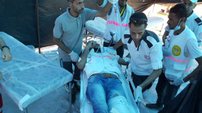
Col. (res.) Liron Libman
Col. (res.) Liron Libman says the rigorous military investigation into the events of August 1, 2014, when over 70 non-combatant Palestinians were killed, meets international expectations of a serious probe into alleged war crimes. However, there's no guarantee there won't be international charges brought against Israeli military and political leaders.
Col. (res.) Liron Libman, the former chief military prosecutor, said Thursday the four-year-long investigation into the events of what has been dubbed as "Rafath's Black Friday" was rigorous and will obstruct international courts from taking legal steps against Israeli defense and political leaders.
Chief Military Advocate General Maj. Gen. Sharon Afek has decided to close the case on the fighting that took place on August 1, 2014—in the midst of Operation Protective Edge in Gaza—without launching any criminal investigations against those involved in the deaths of over 70 non-combatant Palestinians.
The chief military advocate general also determined there was no justification to take steps against any of the officers who led the fighting in the Rafah area that day—such as reprimanding or not promoting them.
"No one can guarantee" there won't be international cases, Libman told Ynet, but "as far as international law is concerned, it is primarily the State of Israel's obligation to examine claims of war crimes or violations of fighting laws by Israeli civilians and soldiers.
"As long as the State of Israel carries out that obligation by conducting an independent, effective, serious examination that is in line with international standards—it blocks the ability to take steps at international courts or foreign nations' courts. The international court is meant to be a last-resort option, only if the state is unwilling or unable to handle the incident."
"It's not that the state has to prosecute someone," Libman clarified. "There's no need to sacrifice people here as scapegoats, but the examination and the investigation has to be serious and real."
He stressed, however, that even if Israelis do face charges at international courts, it would be senior members of the political leadership and the top IDF command. "Certainly not common soldiers, not even a company commander.... mostly heads of the IDF's commands, the IDF chief, the head of Military Intelligence, (and) the defense minister," he said.
He noted that "this kind of investigation is very complex. We're talking about investigating a battle that had many units involved, a lot of soldiers and a lot of fire. A lot of data needs to be collected from a lot of sources, it needs to be cross-checked, sometimes there's a need to go back and check again. There's no doubt there's a lot of work here."
"And yet, four years is a long time, you're right," he allowed. "There's no doubt the State of Israel is under a magnifying glass, certainly when it comes to the Israeli-Palestinian conflict, and I'm confident the goal was to leave no stone unturned, and this takes time."
To demonstrate just how in-depth the investigation was, Libman explained that "among other things, they checked specifically how much ammunition was fired and where. It turns out 1,000 artillery shells were fired at 31 places chosen ahead of time, over the course of four hours. This is one shell every eight minutes. That is measured fire."
Col. (res.) Liron Libman says the rigorous military investigation into the events of August 1, 2014, when over 70 non-combatant Palestinians were killed, meets international expectations of a serious probe into alleged war crimes. However, there's no guarantee there won't be international charges brought against Israeli military and political leaders.
Col. (res.) Liron Libman, the former chief military prosecutor, said Thursday the four-year-long investigation into the events of what has been dubbed as "Rafath's Black Friday" was rigorous and will obstruct international courts from taking legal steps against Israeli defense and political leaders.
Chief Military Advocate General Maj. Gen. Sharon Afek has decided to close the case on the fighting that took place on August 1, 2014—in the midst of Operation Protective Edge in Gaza—without launching any criminal investigations against those involved in the deaths of over 70 non-combatant Palestinians.
The chief military advocate general also determined there was no justification to take steps against any of the officers who led the fighting in the Rafah area that day—such as reprimanding or not promoting them.
"No one can guarantee" there won't be international cases, Libman told Ynet, but "as far as international law is concerned, it is primarily the State of Israel's obligation to examine claims of war crimes or violations of fighting laws by Israeli civilians and soldiers.
"As long as the State of Israel carries out that obligation by conducting an independent, effective, serious examination that is in line with international standards—it blocks the ability to take steps at international courts or foreign nations' courts. The international court is meant to be a last-resort option, only if the state is unwilling or unable to handle the incident."
"It's not that the state has to prosecute someone," Libman clarified. "There's no need to sacrifice people here as scapegoats, but the examination and the investigation has to be serious and real."
He stressed, however, that even if Israelis do face charges at international courts, it would be senior members of the political leadership and the top IDF command. "Certainly not common soldiers, not even a company commander.... mostly heads of the IDF's commands, the IDF chief, the head of Military Intelligence, (and) the defense minister," he said.
He noted that "this kind of investigation is very complex. We're talking about investigating a battle that had many units involved, a lot of soldiers and a lot of fire. A lot of data needs to be collected from a lot of sources, it needs to be cross-checked, sometimes there's a need to go back and check again. There's no doubt there's a lot of work here."
"And yet, four years is a long time, you're right," he allowed. "There's no doubt the State of Israel is under a magnifying glass, certainly when it comes to the Israeli-Palestinian conflict, and I'm confident the goal was to leave no stone unturned, and this takes time."
To demonstrate just how in-depth the investigation was, Libman explained that "among other things, they checked specifically how much ammunition was fired and where. It turns out 1,000 artillery shells were fired at 31 places chosen ahead of time, over the course of four hours. This is one shell every eight minutes. That is measured fire."
15 aug 2018
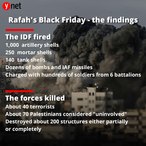
Chief Military Advocate General finds no criminal wrongdoing in IDF forces' conduct in any of the fighting incidents during the 2014 Operation Protective Edge, even those in which non-combatants were killed; also, no investigation to be launched into massive IDF bombardment in Rafah the day Hadar Goldin was killed and abducted.
Chief Military Advocate General Maj. Gen. Sharon Afek has decided to close the case on an event during the 2014 Operation Protective Edge in Gaza that has been dubbed as "Rafah's Black Friday" without launching any criminal investigations against those involved in the deaths of over 70 Palestinians not involved in the fighting.
On August 1, 2014, Hamas took advantage of a ceasefire reached with Israel during Operation Protective Edge to ambush an IDF force, killing Lt. Hadar Goldin, Givati recon company commander Maj. Benaya Sarel and signal operator Staff Sgt. Liel Gidoni.
The Hamas force was able to grab Goldin's body and drag him with them into a tunnel. His body remains in Hamas hands to this day.
During the aggressive pursuit by Givati soldiers of Goldin's kidnappers, some 70 non-combatant Palestinians were killed and hundreds wounded by IDF fire.
The decision not to launch criminal investigations was made after the IDF collected and examined thousands of documents relating to that day, including aerial photos, intelligence data, testimonies from the IDF soldiers and officers involved, operations logs, Palestinian testimonies, reports from both international and Palestinian organizations, radio communication recordings, and reports from internal IDF investigations into the events of that day.
Maj. Gen. Afek did not find any criminal wrongdoings in the conduct of the forces operating in the southern Gaza city of Rafah in search of Goldin in the hours that followed his abduction.
According to three different inquiry teams led by brigadier generals, which examined the events of "Rafah's Black Friday" over the past four years and submitted their findings to the Chief Military Advocate General, 72 Palestinians were killed that day who were legally defined by the IDF as "uninvolved"—meaning, non combatants—including women and children. In addition, 42 terrorists were killed by IDF forces. There were 16 other Palestinians killed in the same area that day, but the IDF has been unable to determined where and how they were killed.
However, the examination also found professional errors and failures in IDF actions that day, and a list has been drawn up of lessons, some of which are already being implemented—including clarifications of the IDF's fire opening policy and the "Hannibal Directive."
Chief Military Advocate General Maj. Gen. Sharon Afek has decided to close the case on an event during the 2014 Operation Protective Edge in Gaza that has been dubbed as "Rafah's Black Friday" without launching any criminal investigations against those involved in the deaths of over 70 Palestinians not involved in the fighting.
On August 1, 2014, Hamas took advantage of a ceasefire reached with Israel during Operation Protective Edge to ambush an IDF force, killing Lt. Hadar Goldin, Givati recon company commander Maj. Benaya Sarel and signal operator Staff Sgt. Liel Gidoni.
The Hamas force was able to grab Goldin's body and drag him with them into a tunnel. His body remains in Hamas hands to this day.
During the aggressive pursuit by Givati soldiers of Goldin's kidnappers, some 70 non-combatant Palestinians were killed and hundreds wounded by IDF fire.
The decision not to launch criminal investigations was made after the IDF collected and examined thousands of documents relating to that day, including aerial photos, intelligence data, testimonies from the IDF soldiers and officers involved, operations logs, Palestinian testimonies, reports from both international and Palestinian organizations, radio communication recordings, and reports from internal IDF investigations into the events of that day.
Maj. Gen. Afek did not find any criminal wrongdoings in the conduct of the forces operating in the southern Gaza city of Rafah in search of Goldin in the hours that followed his abduction.
According to three different inquiry teams led by brigadier generals, which examined the events of "Rafah's Black Friday" over the past four years and submitted their findings to the Chief Military Advocate General, 72 Palestinians were killed that day who were legally defined by the IDF as "uninvolved"—meaning, non combatants—including women and children. In addition, 42 terrorists were killed by IDF forces. There were 16 other Palestinians killed in the same area that day, but the IDF has been unable to determined where and how they were killed.
However, the examination also found professional errors and failures in IDF actions that day, and a list has been drawn up of lessons, some of which are already being implemented—including clarifications of the IDF's fire opening policy and the "Hannibal Directive."
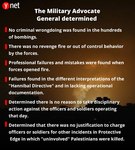
The chief military advocate general also determined there was no justification to taking any steps against any of the officers who led the fighting in the Rafah area that day—such as reprimanding or not promoting them.
As part of the examination of the events of "Rafah's Black Friday," dozens of soldiers involved in the fighting that day provided their version of events to the General Staff's examination team. Most of them were officers who were leading the fighting and some were combat soldiers from the air and ground forces that took part in the intensive pursuit of the terror cell that abducted Goldin.
Among the officers who gave their version of events were then-Givati Brigade Commander Brig. Gen. Ofer Winter, who commanded the forces in the field from the front, and the commander of the Gaza Division at the time, Maj. Gen. Mickey Edelstein, who commanded the forces from the rear.
The Gaza Division was in charge of managing the Air Force's fire during the incident, which killed most of the non-combatant Palestinians. Ten of them were killed by canon fire and five by tank fire. None of the Palestinians who weren't terrorists were killed by small-arms fire, meaning by a combat soldier on the ground.
The chief military advocate general determined that every one of the hundreds of attacks carried out that day was legal. Afek explained this by noting the circumstances of the incident were unusual: This wasn't an isolated incident—that can be controlled and contained—in which an uninvolved Palestinian was killed, but rather a large-scale war event in hostile, dangerous, enemy-filled surroundings, with a clear and unusual mission—to locate a soldier captured, which throughout most of the day was believed to be alive.
The chief military advocate general examined a number of other unusual incidents from Protective Edge in which uninvolved Palestinians were killed. Here too he decided there was no indication of criminal wrongdoing by the forces, finding no instance in which a force opened fired at uninvolved Palestinians intentionally or because of criminal negligence.
Overall, Maj. Gen. Afek determined that there is no justification to filing criminal charges against any IDF combat soldier or officer who was involved in the fighting in any of the incidents throughout the 51 days of Operation Protective Edge, including incidents in which hundreds of uninvolved Palestinians were killed.
The same appears to be the case for two remaining open criminal investigations out of 31 that have been opened and have since been closed without charges being filed. These two investigations concern a Palestinian claim civilians being killed by IDF artillery fire in Jabalia, and another incident in which IDF soldiers allegedly used a Palestinian man—who was unharmed—as a human shield.
The only criminal incident during Protective Edge that resulted in imprisonment concerned Golani soldiers who looted a Palestinian home in Gaza City's Saja'iyya neighborhood, stealing thousands of shekels.
Some 50 additional unusual incidents are still being examined by the General Staff's inquiry mechanism. These examinations are said to be at very advanced stages, and the chief military advocate general is not expected to order a criminal investigation into any of them.
In total, the IDF examined some 500 complaints concerning some 360 incidents throughout Protective Edge. About 220 of them were examined by the General Staff's inquiry mechanism, which includes lawyers from the Military Advocate General's Office.
As part of the examination of the events of "Rafah's Black Friday," dozens of soldiers involved in the fighting that day provided their version of events to the General Staff's examination team. Most of them were officers who were leading the fighting and some were combat soldiers from the air and ground forces that took part in the intensive pursuit of the terror cell that abducted Goldin.
Among the officers who gave their version of events were then-Givati Brigade Commander Brig. Gen. Ofer Winter, who commanded the forces in the field from the front, and the commander of the Gaza Division at the time, Maj. Gen. Mickey Edelstein, who commanded the forces from the rear.
The Gaza Division was in charge of managing the Air Force's fire during the incident, which killed most of the non-combatant Palestinians. Ten of them were killed by canon fire and five by tank fire. None of the Palestinians who weren't terrorists were killed by small-arms fire, meaning by a combat soldier on the ground.
The chief military advocate general determined that every one of the hundreds of attacks carried out that day was legal. Afek explained this by noting the circumstances of the incident were unusual: This wasn't an isolated incident—that can be controlled and contained—in which an uninvolved Palestinian was killed, but rather a large-scale war event in hostile, dangerous, enemy-filled surroundings, with a clear and unusual mission—to locate a soldier captured, which throughout most of the day was believed to be alive.
The chief military advocate general examined a number of other unusual incidents from Protective Edge in which uninvolved Palestinians were killed. Here too he decided there was no indication of criminal wrongdoing by the forces, finding no instance in which a force opened fired at uninvolved Palestinians intentionally or because of criminal negligence.
Overall, Maj. Gen. Afek determined that there is no justification to filing criminal charges against any IDF combat soldier or officer who was involved in the fighting in any of the incidents throughout the 51 days of Operation Protective Edge, including incidents in which hundreds of uninvolved Palestinians were killed.
The same appears to be the case for two remaining open criminal investigations out of 31 that have been opened and have since been closed without charges being filed. These two investigations concern a Palestinian claim civilians being killed by IDF artillery fire in Jabalia, and another incident in which IDF soldiers allegedly used a Palestinian man—who was unharmed—as a human shield.
The only criminal incident during Protective Edge that resulted in imprisonment concerned Golani soldiers who looted a Palestinian home in Gaza City's Saja'iyya neighborhood, stealing thousands of shekels.
Some 50 additional unusual incidents are still being examined by the General Staff's inquiry mechanism. These examinations are said to be at very advanced stages, and the chief military advocate general is not expected to order a criminal investigation into any of them.
In total, the IDF examined some 500 complaints concerning some 360 incidents throughout Protective Edge. About 220 of them were examined by the General Staff's inquiry mechanism, which includes lawyers from the Military Advocate General's Office.
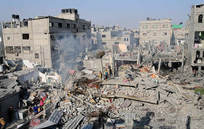
The IDF released Wednesday a 30-page summary in both Hebrew and English of its report on the investigations into "Rafah's Black Friday." It summarizes hundreds of detailed pages about each of the battles that took place that day in the Rafah area.
In addition, the Military Advocate General's Office examined the claims made in reports published since Protective Edge by different bodies, including the UN's Human Rights Council, B'Tselem, Amnesty International and the Palestinian Al Mezan Center for Human Rights. The findings of the examination of these claims were incorporated into the conclusions on each battle and incident.
The main reason it took the chief military advocate general to reach a decision on the case is the fact the IDF was having a hard time collecting testimonies from Palestinians or international elements who witnessed what happened that day.
For the same reason, the IDF has a hard time fully reconstructing the many different operational events of that day, which began at 9am and lasted into the late afternoon, when the forces collected enough findings inside the Hamas tunnel to allow the IDF to declare Goldin a fallen soldier whose place of burial is unknown.
The legality of each attack the IDF carried out in the Rafah area that day was examined separately by a team of lawyers from the Military Advocate General's Office. The team was able to obtain testimonies of Palestinians in indirect manners—through Palestinian aid organizations and Gazan lawyers representing the families of the dead. Their testimonies were collected in meetings at the Erez border crossings, phone calls, and email exchanges. In most of the cases, they provided the IDF with specific information about the death of a Palestinian, based on the coordinates of where it happened.
In addition, the Military Advocate General's Office examined the claims made in reports published since Protective Edge by different bodies, including the UN's Human Rights Council, B'Tselem, Amnesty International and the Palestinian Al Mezan Center for Human Rights. The findings of the examination of these claims were incorporated into the conclusions on each battle and incident.
The main reason it took the chief military advocate general to reach a decision on the case is the fact the IDF was having a hard time collecting testimonies from Palestinians or international elements who witnessed what happened that day.
For the same reason, the IDF has a hard time fully reconstructing the many different operational events of that day, which began at 9am and lasted into the late afternoon, when the forces collected enough findings inside the Hamas tunnel to allow the IDF to declare Goldin a fallen soldier whose place of burial is unknown.
The legality of each attack the IDF carried out in the Rafah area that day was examined separately by a team of lawyers from the Military Advocate General's Office. The team was able to obtain testimonies of Palestinians in indirect manners—through Palestinian aid organizations and Gazan lawyers representing the families of the dead. Their testimonies were collected in meetings at the Erez border crossings, phone calls, and email exchanges. In most of the cases, they provided the IDF with specific information about the death of a Palestinian, based on the coordinates of where it happened.
